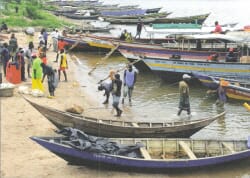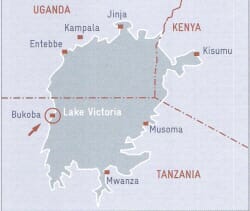
So when the organisation became involved in a sustainable aquaculture project on Lake Victoria, it was not just the fishing methods and maintaining the fish stocks that were brought into question.
The pilot project for sustainable perch fisheries in Bukoba in Tanzania was developed along strict ecological, economic and social guidelines.
Naturland has developed a series of guidelines that focus on:
- Environmentally-friendly use of fish stocks and the entire ecosystem
- Avoidance of critical and environmentally harmful fishing methods
- Compliance with social guidelines for fishermen and employees in the fish processing industry
- Ecologically sound processing without artificial additives or genetic engineering
- A publicly open, transparent approval process for all parts of the value chain.
The organisation chose Lake Victoria for a pilot project n Africa, because, at 68,800 square metres, it is not only the largest lake in Africa, but it is also economically the most important, with up to a million tonnes of fish caught there each year.
Nile perch are the most common of the fish being caught and up to 75 per cent of the fish caught is exported to Europe, Asia and the USA.

However, while the lake is a source of income for the fishermen of Tanzania, Kenya and Uganda, the fish stocks have started to become exploited and depleted and the working and living conditions of the fishing community are often very poor.
Because of this Naturland established a pilot project at Bukoba in Tanzania together with seafood importer Anova, fish processor Vicfish, the German association for technical cooperation GTZ and the consultancy firm, AgroEco.
The group laid down standards to be achieved in the new project on the Naturland guidelines, to implement strict instructions on fishing equipment and minimum fish sizes as well as fair working conditions for the employees in the processing plants.
The group also set out a transparent pricing system and a fair trading system between the fishermen and the exporters. They also called for safe working conditions, including the use of life jackets on the boats . And, for the social responsibility side of the deal, they established child day care centres and schools in the fishing settlements and an all-in health care programme.
The landing sites for the fish were also in need of improved sanitation and the settlements needed access to clean drinking water.
Jacob Maiseli from Vicfish said: "We are starting with a small area that deals with eight landing sites and we are also including adult education for the fisherfolk."
He added that the social side of the project also includes an HIV awareness scheme educating the fishermen through posters, books and through a mobile unit that is testing for HIV.
"We also have an anti-malaria programme handing out mosquito nets to the people," Mr Maiseli added.
The amount of intervention varied according to individual village needs, but they found that by installing a system of management through the chairmen of the beach management units, the investment and the degree of intervention could be channelled appropriately.
The programme was started in the middle of 2008 and already has shown success in the sustainability of the fishing stocks. It is earmarked to really take of this summer.
The involvement of Naturland in the project means that the fish that is caught in the lake is certified and labelled as coming from sustainable stocks, which helps with its sales to major supermarket chains such as Metro, Wal-Mart and Lidl.
One of the major concerns the project leaders faced was that by restricting the catches to ensure sustainable fish stocks, the fishermen feared that they would face a cut in income. The challenge they faced was to generate an understanding of the long term benefits, whilst at the same time providing tangible incentives to encourage the fishermen to observe the new rules.
These incentives were provided in the economic and social provisions set out in the deal as well as the eco-label scheme that provided a better margin on the fish they caught.
For the Bukoba project, the Vicfish processor was in charge of the financing and coordinating and implementing the stages of the programme.
However, the organisers said that the development of local capacity for eco-labelling for all three countries on the lake was a major development and the backbone of the sustainability of the fish stocks and the marketing of the fish.
June 2009




